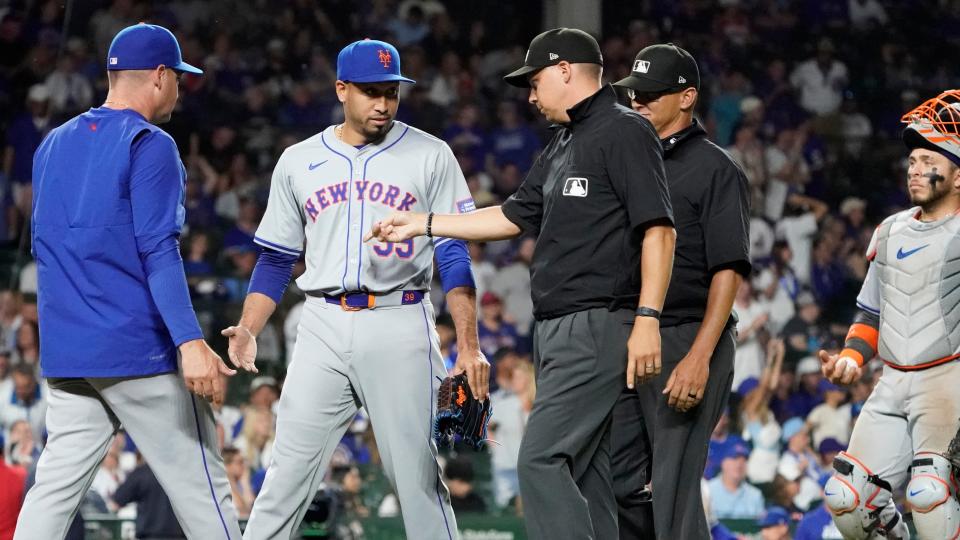Edwin Diaz's 'sticky hand' ejection the latest example of MLB's arbitrary rule
When Mets closer Edwin Diaz was ejected on Sunday night before throwing a pitch, he became the third Mets pitcher in the last year and change to fall victim to MLB's arbitrary sticky stuff rules.
The reason behind cracking down on sticky stuff is sound. The point is to prevent pitchers from using illegal substances (like spider tack) that could give them an unfair advantage -- an issue that was spiraling out of control a bit before these new rules went into effect.
But pitchers need to be able to grip the ball properly in order to be able to control where they're throwing a dangerous projectile. And the interpretation and enforcement of the rules is ridiculous.
Specifically, they are arbitrary, unscientific, and basically not challengeable -- meaning that a pitcher will face an automatic 10-game suspension because an umpire claims he did something that cannot be proven.
Any umpire on any given day can rule that any pitcher has violated the rules. But that umpire is not required to provide any actual justification for an ejection.
Speaking after the game, Diaz said that his right hand had the same three things on it as always -- rosin (a legal substance that is on the mound), sweat, and dirt -- you know, the stuff on the baseball field.
"I just said I use the same thing as always," Diaz explained. "I rub rosin, sweat, and I put my hand in the dirt a little bit because I need to have some grip on the ball. So that's what I was explaining to them, but they said it was too much stick. I understood. But at the end of the day, I was using rosin, sweat, and put my hand in the dirt.
"I was really surprised because I didn't have anything on my hand, my glove, my belt. They always check my hat, everything. And they thought that was sticky a lot. I said you could check my hand, smell my hand, and they didn't smell anything, but they threw me out of the game."
As Diaz noted, the umpires did not find anything illegal on his glove or belt. They also didn't take his glove -- giving it back to him as he exited the field.
They of course also didn't take any evidence from his hand, which could've theoretically been checked for the illegal substance umpire Vic Carapazza suggested Diaz was using.
Doing anything scientific that could prove their claims isn't part of MLB's protocol here.

"It definitely wasn’t rosin and sweat," Carapazza told a pool reporter after the game. "We’ve checked thousands of these. I know what that feeling is. This was very sticky."
There are numerous problems with what Carapazza said.
The first is that because it was said through a pool reporter, it wasn't challenged with any follow-up questions.
The second is that he is making a serious claim without proof -- speaking in definitive terms about something he couldn't possibly be certain of.
And therein lies the problem with MLB's sticky stuff rules.
The same thing happened to Drew Smith last year.
And Smith, who relieved Diaz on Sunday after the closer was ejected, said after the game that he never received any clarification from the league on why he was ejected and suspended last June, and that he has done nothing differently since when it comes to what he puts on his hand before each outing.
To be clear, there are no villains here.
Carapazza believes what he is saying.
Diaz and Smith believe what they're saying.
But until MLB comes up with a better way to deal with these situations, ridiculous scenes like the one we witnessed on Sunday night are going to keep happening -- with the league penalizing players without proof and putting their teams at a significant disadvantage in the process.

